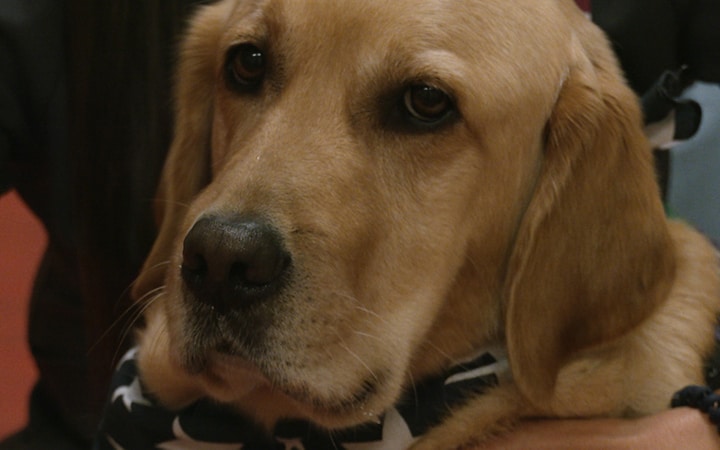On a small farm tucked away near the coast of South Carolina, horses are helping sexual assault survivors and others who have experienced traumatic events reconnect with the world.
Meanwhile, a yellow lab and golden retriever mix is helping patients keep calm during hospital visits to Prisma Health in Columbia.
Horses and dogs are the two most common forms of animal assisted therapy for many who experience various forms of trauma and anxiety.
Susan McKinney, who runs the Barnabas Horse Foundation with the aid of a team of psychologists, opened her horse stable after several family tragedies. She said the horses, some of which she has rescued, helped the family heal.
“Everything we do on the farm is about teaching our clients how to have healthy, connected relationships. First with themselves, then with their horse. Then they take that out into what we call ‘Humanville’,” McKinney said.
McKinney’s sanctuary offers therapeutic experiences in many forms including “sensory walks” or quiet rides on the horses’ backs that gives the feeling of physical connection. She explained that a horse’s pace and the ability to smell and touch anything in front give the rider the feeling of re-connection with the world.
The stable location is kept secret because some of McKinney’s clients are victims of sexual assault, domestic violence and other crimes. She says this is a “happy place,” and her horses are the ultimate key in her clients’ healing process, noting a horse’s natural fight, flight or freeze instincts will mirror whether they feel safe around someone.
Equine-assisted therapy is all about a strong relationship and trust, McKinney explained.
“You could tell me all day that you’re doing fine, and inside you could be in such turmoil. A horse is gonna call ‘baloney sandwich’ on it, and they’re gonna move away from you,” McKinney said.
Often an instant connection is important too. Bethany Clark, a pediatric outpatient physical and specialty therapist at Prisma Health in Columbia, spends her work days with a furry sidekick.
Chiver, a 3-year-old yellow lab and golden retriever mix, helps keep her patients calm during visits to the hospital.
“It’s almost like they go into fight or flight. They see us and it’s like, ‘Oh, no. Another person in scrubs. I don’t want them touching me.’ There’s a lot of anxiety,” Clark said. “With Chiver and with all dogs in the work place, there’s been a lot of research to show it kind of helps them calm down.”
Clark said having Chiver around not only calms her patients but motivates them to work on their physical therapy exercises. For example, if a patient is climbing stairs, Chiver will climb the stairs too. If Clark instructs a patient to do wall sits, Chiver will sit against the wall along-side the patient.
Clark said that members of the hospital staff benefit from Chiver’s presence as well as the patients.
“He picks up when people have bad days, and he is straight to them and sits next to them and is like, ‘I’m gonna hang out with you today because you need it’,” Clark said.
While horses and dogs require different relationships for the animal assisted therapy to work, McKinney and Clark agree that connection is key to the healing process.
“It’s so easy to get caught up in the day-to-day and all of the stress factors,” Clark said. “When you kind of just have a quiet moment where you can connect with another being, it’s great.”


